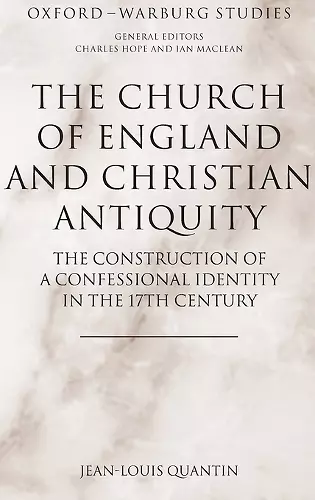The Church of England and Christian Antiquity
The Construction of a Confessional Identity in the 17th Century
Format:Hardback
Publisher:Oxford University Press
Published:12th Feb '09
Currently unavailable, and unfortunately no date known when it will be back

Today, the statement that Anglicans are fond of the Fathers and keen on patristic studies looks like a platitude. Like many platitudes, it is much less obvious than one might think. Indeed, it has a long and complex history. Jean-Louis Quantin shows how, between the Reformation and the last years of the Restoration, the rationale behind the Church of England's reliance on the Fathers as authorities on doctrinal controversies, changed significantly. Elizabethan divines, exactly like their Reformed counterparts on the Continent, used the Church Fathers to vindicate the Reformation from Roman Catholic charges of novelty, but firmly rejected the authority of tradition. They stressed that, on all questions controverted, there was simply no consensus of the Fathers. Beginning with the 'avant-garde conformists' of early Stuart England, the reference to antiquity became more and more prominent in the construction of a new confessional identity, in contradistinction both to Rome and to Continental Protestants, which, by 1680, may fairly be called 'Anglican'. English divines now gave to patristics the very highest of missions. In that late age of Christianity - so the idea ran - now that charisms had been withdrawn and miracles had ceased, the exploration of ancient texts was the only reliable route to truth. As the identity of the Church of England was thus redefined, its past was reinvented. This appeal to the Fathers boosted the self-confidence of the English clergy and helped them to surmount the crises of the 1650s and 1680s. But it also undermined the orthodoxy that it was supposed to support.
Quantin tells this complex, ironic story with cosmopolitan learning, a sharp, ironic wit, and a fine English style. A TLS Book of the Year. * Anthony Grafton, Times Literary Supplement *
A work of great style and even greater scholarship, in which Quantin demolishes the Anglo-Catholic myth of a 'distinctive' Anglican identity based upon monolithic respect for early patristic teaching and apparently consolidated in the 17th century. Anglican apologists should read and take note. * William Poole, Times Higher Education *
Magisterial work... has any English scholar deconstructed the myth of Anglicanism with such formidable sweep and erudition? * J. Coffey, English Historical Review *
This substantial and deeply learned work is a milestone publication which ought to be recommended reading for any historian working on the history of religious ideas, on the history of erudition and the nature of religious change in the long seventeenth century in the British Isles... Quantin's book beautifully composed and profoundly reflective deserves a very broad readership. * Justin Champion, The Journal of Ecclesiastical History *
Jean-Louis Quantin has written with the utmost care on the place of patristics in early Anglican identity-formation... a book that anyone interested in scholarship "of the Christian past" or in the continual reinvention of the Anglican past should read. * Benjamin King, Anglican and Episcopal History *
Readers of this volume cannot help but be impressed at Quantin's mastery of the sources and prodigious multi-lingual reading around the subject. Quantin's contribution to the field is most welcome...a formidable and well-produced piece of research * Themelios *
This book is an erudite account of how the Church of England received, interpreted, and respected the testimony of Christian antiquity from the archiepiscopate of Thomas Cranmer to the Glorious Revolution of 1688. * Robin Ward, Church Times *
Quantin's scope and achievement is vast. * Kenneth Padley, Journal of Anglican Studies *
A much-needed addition to our understanding of the early modern Church of England. It is built on extremely detailed research, and the author seems impressively comfortable discussing the whole period covered. * Jacqueline Rose, The Historical Journal *
Quantin's achievement in this book...is remarkable...a magnificent and valuable book * Thomas Fedrick-Illsley, Reviews in Religion & Theology *
A magisterial study of seventeenth century patristic scholarship. * Geordan Hammond, Fides et Historia *
Splendid...Quantin's study has important contributions to make in a number of disparate fields...likely to remain the starting-point for further enquiry into the subject for many years * Peter Webster, Reviews in History *
Quantin has written a valuable and challenging text of use to all engaged in the task of defining and assessing the character of the Church of England and its global Anglican variations. * Ivan Head, Journal of Religious History *
a carefully researched study * David Rainey, Wesley and Methodist Studies *
Quantin's work is a vital addition to the library of any scholar who wants to understand a crucial period of Anglican myth-making. The image of the Anglican patristic scholar is still very much alive and we all have much to be grateful to Quantin for so clearly charting its creation. * Michael Brydon, Journal of Theological Studies *
ISBN: 9780199557868
Dimensions: 223mm x 148mm x 33mm
Weight: 765g
518 pages